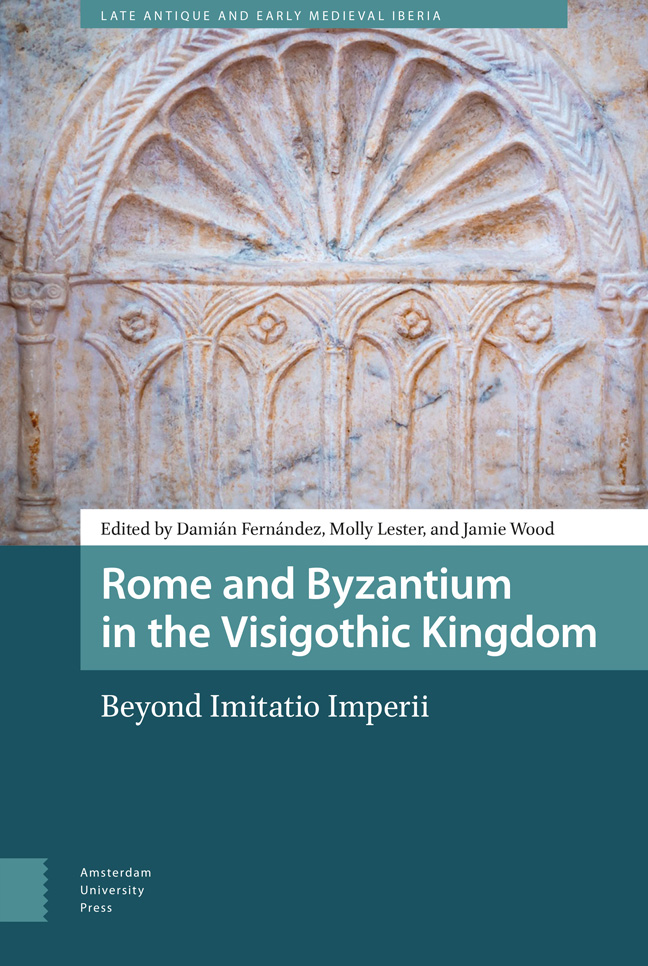Book contents
- Frontmatter
- Contents
- List of Figures and Tables
- Abbreviations
- Acknowledgements
- Maps
- Introduction
- 1 Visigothic Spain and Byzantium: The Story of a Special (Historiographical) Relationship
- 2 The Development of the Visigothic Court in the Hagiography of the Fifth and Sixth Centuries
- 3 Experiments in Visigothic Rulership: Minting and Monetary Reforms under Alaric II
- 4 A Comparison of Roman and Visigothic Approaches to Exile
- 5 The Roman Jewel in the Visigothic Crown: A Reassessment of the Royal Votive Crowns of the Guarrazar Treasure
- 6 Capitalhood in the Visigothic Kingdom
- 7 Making Rite Choices: Roman and Eastern Liturgies in Early Medieval Iberia
- 8 Ethnicity and Imitatio in Isidore of Seville
- 9 Re-imagining Roman Persecution in the Visigothic Passions
- 10 Romanness in Visigothic Hagiography
- 11 Empire and the Politics of Faction: Mérida and Toledo Revisited
- 12 The Agents and Mechanics of Connectivity: The Mediterranean World and the Cities of the Guadiana Valley in the Sixth Century
- 13 Staying Roman after 711?
- Index
9 - Re-imagining Roman Persecution in the Visigothic Passions
Published online by Cambridge University Press: 20 February 2024
- Frontmatter
- Contents
- List of Figures and Tables
- Abbreviations
- Acknowledgements
- Maps
- Introduction
- 1 Visigothic Spain and Byzantium: The Story of a Special (Historiographical) Relationship
- 2 The Development of the Visigothic Court in the Hagiography of the Fifth and Sixth Centuries
- 3 Experiments in Visigothic Rulership: Minting and Monetary Reforms under Alaric II
- 4 A Comparison of Roman and Visigothic Approaches to Exile
- 5 The Roman Jewel in the Visigothic Crown: A Reassessment of the Royal Votive Crowns of the Guarrazar Treasure
- 6 Capitalhood in the Visigothic Kingdom
- 7 Making Rite Choices: Roman and Eastern Liturgies in Early Medieval Iberia
- 8 Ethnicity and Imitatio in Isidore of Seville
- 9 Re-imagining Roman Persecution in the Visigothic Passions
- 10 Romanness in Visigothic Hagiography
- 11 Empire and the Politics of Faction: Mérida and Toledo Revisited
- 12 The Agents and Mechanics of Connectivity: The Mediterranean World and the Cities of the Guadiana Valley in the Sixth Century
- 13 Staying Roman after 711?
- Index
Summary
Abstract
Despite the intervening centuries, the Iberian martyr passions show how important the later Roman world—especially its sites of judicial torture and spectacular punishment—was to the Visigothic Christian imaginary. For most Christians, the dominant notion of sanctity remained the urban martyr, who, more than the bloodless ‘confessor’, was commemorated in the liturgy, who attracted large-scale civic devotion, and whose cult sites underlay the spiritual topography of the kingdom's cities. I argue that the passions attempted to reinterpret the Roman city—to make its ancient physical vestiges legible within a Christian framework which served ideals of civic Christianity in the present. The Visigothic civic imaginary, therefore, was intimately tied into the memory of the Roman city.
Keywords: martyrdom; sanctity; urban history; memory; liturgy; popular religion; material religion; passions; Prudentius
Introduction: Martyrs and Confessors
No texts from the Visigothic period were more consistently engaged with the memory of the Roman past than the martyr passions. Though redacted mainly in the sixth and seventh centuries, the Iberian passions vividly evoked the world of the Roman persecutions over two centuries earlier. Modern historians put little faith in their historical veracity—only the Passio Fructuosi, Augurii et Eulogii, known to Augustine of Hippo, appears in corpora of ‘genuine’ ancient passions—but what they do reveal is the cultivation of a useful Roman past by post-Roman Christians. This past was presented to a wide audience through liturgical reading. In Robert Markus's words, ‘on a large number of the year's days, a Christian who attended a church service would be liturgically thrust back into the age of the martyrs’. Historians, however, have been more inclined to think about the other side of the equation—how the martyrs, in relics or legendary retellings, were brought into a new medieval world. Markus's insight has not been sufficiently appreciated.
It is frequently suggested that the figure of the bloody martyr was superseded by new modes of sanctity, particularly that of the ascetic ‘confessor’ saint. This assertion rests on a strand of argument advanced by late antique Christian authorities themselves. The idea of martyrdom and the genre of the martyr passion were deeply embedded in the violence of the Roman persecutions and the distinctive Roman cultural world of judicial tortures and spectacular entertainments.
- Type
- Chapter
- Information
- Rome and Byzantium in the Visigothic KingdomBeyond Imitatio Imperii, pp. 223 - 252Publisher: Amsterdam University PressPrint publication year: 2023



